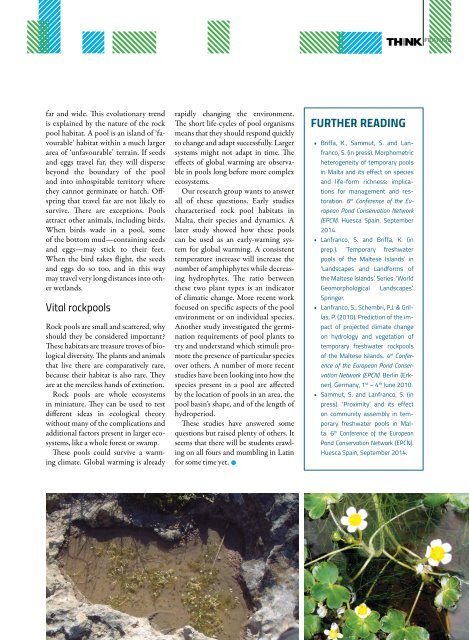You also want an ePaper? Increase the reach of your titles
YUMPU automatically turns print PDFs into web optimized ePapers that Google loves.
logy psrt<br />
THINK Feature<br />
far and wide. This evolutionary trend<br />
is explained by the nature of the rock<br />
pool habitat. A pool is an island of ‘favourable’<br />
habitat within a much larger<br />
area of ‘unfavourable’ terrain. If seeds<br />
and eggs travel far, they will disperse<br />
beyond the boundary of the pool<br />
and into inhospitable territory where<br />
they cannot germinate or hatch. Offspring<br />
that travel far are not likely to<br />
survive. There are exceptions. Pools<br />
attract other animals, including birds.<br />
When birds wade in a pool, some<br />
of the bottom mud—containing seeds<br />
and eggs—may stick to their feet.<br />
When the bird takes flight, the seeds<br />
and eggs do so too, and in this way<br />
may travel very long distances into other<br />
wetlands.<br />
Vital rockpools<br />
Rock pools are small and scattered, why<br />
should they be considered important?<br />
These habitats are treasure troves of biological<br />
diversity. The plants and animals<br />
that live there are comparatively rare,<br />
because their habitat is also rare. They<br />
are at the merciless hands of extinction.<br />
Rock pools are whole ecosystems<br />
in miniature. They can be used to test<br />
different ideas in ecological theory<br />
without many of the complications and<br />
additional factors present in larger ecosystems,<br />
like a whole forest or swamp.<br />
These pools could survive a warming<br />
climate. Global warming is already<br />
rapidly changing the environment.<br />
The short life-cycles of pool organisms<br />
means that they should respond quickly<br />
to change and adapt successfully. Larger<br />
systems might not adapt in time. The<br />
effects of global warming are observable<br />
in pools long before more complex<br />
ecosystems.<br />
Our research group wants to answer<br />
all of these questions. Early studies<br />
characterised rock pool habitats in<br />
Malta, their species and dynamics. A<br />
later study showed how these pools<br />
can be used as an early-warning system<br />
for global warming. A consistent<br />
temperature increase will increase the<br />
number of amphiphytes while decreasing<br />
hydrophytes. The ratio between<br />
these two plant types is an indicator<br />
of climatic change. More recent work<br />
focused on specific aspects of the pool<br />
environment or on individual species.<br />
Another study investigated the germination<br />
requirements of pool plants to<br />
try and understand which stimuli promote<br />
the presence of particular species<br />
over others. A number of more recent<br />
studies have been looking into how the<br />
species present in a pool are affected<br />
by the location of pools in an area, the<br />
pool basin’s shape, and of the length of<br />
hydroperiod.<br />
These studies have answered some<br />
questions but raised plenty of others. It<br />
seems that there will be students crawling<br />
on all fours and mumbling in Latin<br />
for some time yet.<br />
•<br />
FURTHER READING<br />
• Briffa, K., Sammut, S. and Lanfranco,<br />
S. (in press). Morphometric<br />
heterogeneity of temporary pools<br />
in Malta and its effect on species<br />
and life-form richness: implications<br />
for management and restoration.<br />
6 th Conference of the European<br />
Pond Conservation Network<br />
(EPCN). Huesca Spain, September<br />
2014.<br />
• Lanfranco, S. and Briffa, K. (in<br />
prep.). ‘Temporary freshwater<br />
pools of the Maltese Islands’ in<br />
‘Landscapes and Landforms of<br />
the Maltese Islands’. Series: ‘World<br />
Geomorphological Landscapes’.<br />
Springer.<br />
• Lanfranco, S., Schembri, P.J. & Grillas,<br />
P. (2010). Prediction of the impact<br />
of projected climate change<br />
on hydrology and vegetation of<br />
temporary freshwater rockpools<br />
of the Maltese Islands. 4 th Conference<br />
of the European Pond Conservation<br />
Network (EPCN). Berlin (Erkner),<br />
Germany, 1 st – 4 th June 2010.<br />
• Sammut, S. and Lanfranco, S. (in<br />
press). ‘Proximity’ and its effect<br />
on community assembly in temporary<br />
freshwater pools in Malta.<br />
6 th Conference of the European<br />
Pond Conservation Network (EPCN).<br />
Huesca Spain, September 2014.<br />
25


